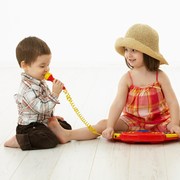 MonkeyBusiness Images/PhotoSpin
MonkeyBusiness Images/PhotoSpin
For centuries, parents have used music to bond with, teach and soothe their children.
Musical tastes and styles vary. Yet parents of every culture and every language engage in musical activities with their children, or use music in some way to lull their children to sleep.
“Parents know instinctively what scientists have now proven: young children thrive on music.” (1)
Music: the key to Early Life Skills
Researchers believe that kids who grow up being exposed to a wide variety of musical types, and who play music or sing regularly, do better in reading and math when they start school. They are able to focus and control their bodies better, get along better with others, and have higher self-esteem. (2)
Psychologists and other experts who study music and its role in early childhood development now know that when young children consistently engage in an age-appropriate, socially accepting musical environment, they…
1) Gain the speech pattern recognition, spoken language and comprehension foundations for reading.
2) Build spatial-temporal and reasoning skills needed to succeed in math, science, and engineering.
3) Develop social and emotional skills, such as self-regulation and relating to others, essential for early school success.
4) Improve their gross and fine motor skills through moving and dancing to music and playing simple instruments.
5) Encourage creativity and inspiration through musical activities that are fun and friendly. (1)
There’s so much information regarding the connection between musical and many aspects of childhood development that there’s no room in this article to cover it all.
Please visit < a href= http://www.edu-cyberpg.com/Music/Musicsmart2.html>this article to find out more.
Encouraging Musical Learning
Here are some ways to encourage music participation in your house (adapted from KidsHealth.org.):
1) Point out sounds around the house or while you’re out with your child that have a beat – clocks, car horns, dogs barking – and talk about the differences or uniqueness of each sound.
2) Put on music and dance with your child. Change the rhythm and tempo of your body and invite your child to imitate you. Add props like scarves for a visual element.
The combination of music and movement helps preschoolers learn to control their bodies, which leads to better concentration skills and self-control.
3) Use rhythm sticks, bells, or make your own instruments with containers and seeds, rice and beans, or string, rubber bands, and shoe boxes, and old coffee cans. Add your child’s favorite CD and watch them air guitar and jam along.
4) You can listen to music or sing in the car, while you’re working, or while your children are playing.
Leave musical instruments within their reach. A kid-friendly CD player would be a great addition to a child's room.
5) Choose a preschool program that encourages music participation and learn the songs so you can do them at home with your child.
6) Find out about and enroll your child in a preschool music class.
7) Take your child to live musical performances at museums, libraries and bookstores, which are especially geared for preschoolers. Outdoor concerts allow preschoolers to dance and move around.
Source:
1) Benefits of Music. Kindermusik.com. Web. Jan 29, 2013.
http://www.kindermusik.com/about
2) Introducing Preschoolers to Music. KidsHealth.org. Web. Jan 29, 2013.
http://kidshealth.org/parent/growth/learning/preschool_music.html
Reviewed January 30, 2013
by Michele Blacksberg RN
Edited by Jody Smith





Add a CommentComments
There are no comments yet. Be the first one and get the conversation started!